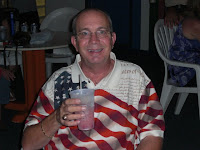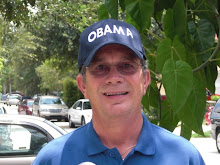Democratic presidential front-runner Barack Obama has been weathering a small storm lately in the LGBT community for being too tight-lipped with gay and lesbian news media.
Unlike his rival Hillary Clinton, who's given interviews to Logo and several local papers since appearing on the cover of The Advocate last fall, the Illinois senator has talked only once, to The Advocate, to address the Donnie McClurkin controversy. But last week his campaign offered our magazine an exclusive sit-down in Chicago with the man who may well become the next president of the United States.
To some extent, it symbolizes the brilliance of a protracted primary contest where candidates continually pivot and adjust in order to engage ever more voters. Had the race stopped cold in the snows of New Hampshire, gays and lesbians would have been left with one interview of record for each Democratic candidate in total.
But in a wide-ranging interview this Monday, Obama discussed "don't ask, don't tell," the Reverend Wright, and why LGBT folks should lead on marriage equality, not politicians. Some may call the chat a shrewd political move by the Obama camp ahead of the April 22 Pennsylvania primary. We call it access.
The Advocate: Let’s start with what’s hot -- why the silence on gay issues? You’ve done only one other interview with the LGBT press. I know people wish they were hearing more from you.
Senator Obama: I don’t think it’s fair to say "silence" on gay issues. The gay press may feel like I’m not giving them enough love. But basically, all press feels that way at all times. Obviously, when you’ve got a limited amount of time, you’ve got so many outlets. We tend not to do a whole bunch of specialized press. We try to do general press for a general readership.
But I haven’t been silent on gay issues. What’s happened is, I speak oftentimes to gay issues to a public general audience. When I spoke at Ebenezer Church for King Day, I talked about the need to get over the homophobia in the African-American community; when I deliver my stump speeches routinely I talk about the way that antigay sentiment is used to divide the country and distract us from issues that we need to be working on, and I include gay constituencies as people that should be treated with full honor and respect as part of the American family.
So I actually have been much more vocal on gay issues to general audiences than any other presidential candidate probably in history. What I probably haven’t done as much as the press would like is to put out as many specialized interviews. But that has more to do with our focus on general press than it does on… I promise you, the African-American press says the same thing.
And Spanish-language?
And Spanish-language [outlets] had the same gripe. Just generally, we have generally tried to speak to broader audiences. That’s all that is.
I think the underlying fear of the gay community is that if you get into office, will LGBT folks be last on the priority list?
I guess my point would be that the fact that I’m raising issues accordant to the LGBT community in a general audience rather than just treating you like a special interest that is sort of off in its own little box -- that, I think, is more indicative of my commitment. Because ultimately what that shows is that I’m not afraid to advocate on your behalf outside of church, so to speak. It’s easy to preach to the choir; what I think is harder is to speak to a broader audience about why these issues are important to all Americans.
If you were elected, what do you plan to do for the LGBT community -- what can you reasonably get done?
I reasonably can see “don’t ask, don’t tell” eliminated. I think that I can help usher through an Employment Non-Discrimination Act and sign it into law.
You think it’s transgender-inclusive?
I think that’s going to be tough, and I’ve said this before. I have been clear about my interest in including gender identity in legislation, but I’ve also been honest with the groups that I’ve met with that it is a heavy lift through Congress. We’ve got some Democrats who are willing to vote for a noninclusive bill, but we lose them on an inclusive bill, and we just may not be able to generate the votes. I don’t know. And obviously, my goal would be to get the strongest possible bill -- that’s what I’ll be working for.
The third thing I believe I can get done is in dealing with federal employees, making sure that their benefits, that their ability to transfer health or pension benefits the same way that opposite-sex couples do, is something that I’m interested in making happen and I think can be done with some opposition, some turbulence, but I think we can get that done.
And finally, an area that I’m very interested in is making sure that federal benefits are available to same-sex couples who have a civil union. I think as more states sign civil union bills into law the federal government should be helping to usher in a time when there’s full equality in terms of what that means for federal benefits.
I assume you’re talking about the Defense of Marriage Act.
Absolutely, and I for a very long time have been interested in repeal of DOMA.
Do you think it’s possible to get full repeal of DOMA? As you know, Senator Clinton is only looking at repealing the plank of DOMA that prohibits the federal government from recognizing state-sanctioned unions.
I don’t know. But my commitment is to try to make sure that we are moving in the direction of full equality, and I think the federal government historically has led on civil rights -- I’d like to see us lead here too.
Back to “don’t ask, don’t tell” real quick -- you’ve said before you don’t think that’s a heavy lift. Of course, it would be if you had Joint Chiefs who were against repeal. Is that something you’ll look at?
I would never make this a litmus test for the Joint Chiefs of Staff. Obviously, there are so many issues that a member of the Joint Chiefs has to deal with, and my paramount obligation is to get the best possible people to keep America safe. But I think there’s increasing recognition within the Armed Forces that this is a counterproductive strategy -- ya know, we’re spending large sums of money to kick highly qualified gays or lesbians out of our military, some of whom possess specialties like Arab-language capabilities that we desperately need. That doesn’t make us more safe, and what I want are members of the Joint Chiefs of Staff who are making decisions based on what strengthens our military and what is going to make us safer, not ideology.
Both you and your wife speak eloquently about being told to wait your turn and how if you had done that, you might not have gone to law school or run for Senate or even president. To some extent, isn’t that what you’re asking same-sex couples to do by favoring civil unions over marriage -- to wait their turn?
I don’t ask them that. Anybody who’s been at an LGBT event with me can testify that my message is very explicit -- I don’t think that the gay and lesbian community, the LGBT community, should take its cues from me or some political leader in terms of what they think is right for them. It’s not my place to tell the LGBT community, "Wait your turn." I’m very mindful of Dr. King’s “Letter From Birmingham Jail,” where he says to the white clergy, "Don’t tell me to wait for my freedom."
So I strongly respect the right of same-sex couples to insist that even if we got complete equality in benefits, it still wouldn’t be equal because there’s a stigma associated with not having the same word, marriage, assigned to it. I understand that, but my perspective is also shaped by the broader political and historical context in which I’m operating. And I’ve said this before -- I’m the product of a mixed marriage that would have been illegal in 12 states when I was born. That doesn’t mean that had I been an adviser to Dr. King back then, I would have told him to lead with repealing an antimiscegenation law, because it just might not have been the best strategy in terms of moving broader equality forward.
That’s a decision that the LGBT community has to make. That’s not a decision for me to make.
Is it fair for the LGBT community to ask for leadership? In 1963, President Kennedy made civil rights a moral issue for the country.
But he didn’t overturn antimiscegenation. Right?
True enough.
As I said, I think the LGBT community has every right to push for what it thinks is right. And I think that it’s absolutely fair to ask me for leadership, and my argument would be that I’m ahead of the curve on these issues compared to 99% of most elected officials around the country on this issue. So I think I’ve shown leadership.
What event or person has most affected your perceptions of or relationship to the LGBT community?
Well, it starts with my mom, who just always instilled in me a belief that everybody’s of equal worth and a strong sense of empathy -- that you try to see people through their eyes, stand in their shoes. So I think that applies to how I see all people.
Somebody else who influenced me, I actually had a professor at Occidental -- now, this is embarrassing because I might screw up his last name -- Lawrence Goldyn, I think it was. He was a wonderful guy. He was the first openly gay professor that I had ever come in contact with, or openly gay person of authority that I had come in contact with. And he was just a terrific guy. He wasn’t proselytizing all the time, but just his comfort in his own skin and the friendship we developed helped to educate me on a number of these issues.
Did you have a chance to ask him about being gay?
I’m sure we did, but as I said, he was really comfortable in his own skin, and the relationship was a strong friendship and I never felt as if I had to get over any mental hurdles to be close to him or to learn from him. He’s probably somebody who had a strong influence.
How old were you then?
Eighteen … 19. It does remind me, though, I remember in my first two years of college that was when I first saw students who were self-identified as gay and lesbian come out and start organizing around gay issues, so that would have been in 1979 and ’80. I think what’s encouraging is just to see how much progress has been made in such a relatively short period of time.
Just draw that thought out a little bit in terms of comparing it to the African-American civil rights movement.
You always want to be careful comparing groups that have been discriminated against because each group’s experiences are different. I think that the transition toward fuller acceptance of the LGBT community has happened without some of the tumult and violence that accompanied the civil rights movement. But we still have a long ways to go, and I think that it also obviously varies geographically. I think in urban communities, you can’t say there’s full equality, but in terms of the LGBT community daily round they’re not as likely to experience certainly the discrimination that they experienced 25 years ago.
Whereas, in the African-American community, you can still see some fairly overt racism. On the other hand, in rural communities, I think attitudes are slower to change.
There’s plenty of homophobia to go around, but you have a unique perspective into the African-American community. Is there a…
I don’t think it’s worse than in the white community. I think that the difference has to do with the fact that the African-American community is more churched and most African-American churches are still fairly traditional in their interpretations of Scripture. And so from the pulpit or in sermons you still hear homophobic attitudes expressed. And since African-American ministers are often the most prominent figures in the African-American community those attitudes get magnified or amplified a little bit more than in other communities.
Do you think there’s a specific prescriptive, which is not to say that there’s more homophobia in the African-American community. But is there a different answer to…
Well, I think what’s important is to have some of that church leadership speak up and change its attitudes, because I think a lot of its members are taking cues from that leadership.
Do you have any regrets about the South Carolina tour? People there are still sort of mystified that you gave Donnie McClurkin the chance to get up onstage and do this, and he did go on sort of an antigay rant there.
I tell you what -- my campaign is premised on trying to reach as many constituencies as possible and to go into as many places as possible, and sometimes that creates discomfort or turbulence. This goes back to your first question. If you’re segmenting your base into neat categories and constituency groups and you never try to bring them together and you just speak to them individually -- so I keep the African-Americans neatly over here and the church folks neatly over there and the LGBT community neatly over there -- then these kinds of issues don’t arise.
The flip side of it is, you never create the opportunity for people to have a conversation and to lift some of these issues up and to talk about them and to struggle with them, and our campaign is built around the idea that we should all be talking. And that creates some discomfort because people discover, gosh, within the Democratic Party or within Barack Obama’s campaign or within whatever sets of constituencies there are going to be some different points of view that might even be offensive to some folks. That’s not unique to this issue. I mean, ironically, my biggest … the biggest political news surrounding me over the last three weeks has been Reverend Wright, who offended a whole huge constituency with some of his statements but has been very good on gay and lesbian issues. I mean he’s one of the leaders in the African-American community of embracing, speaking out against homophobia, and talking about the importance of AIDS.
And so nobody is going to be perfectly aligned with my views. So what I hope is that people take me for who I am, for what I’ve said, and for what I’ve displayed in terms of my commitment to these issues, but understanding that there’s going to be a range of constituencies that I’m reaching out to and working on issues that we have in common, even though I may differ with them on other issues. And that’s true, also, by the way … well, I think that’s going to be true so long as I’m reaching out beyond the traditional Democratic base.






















